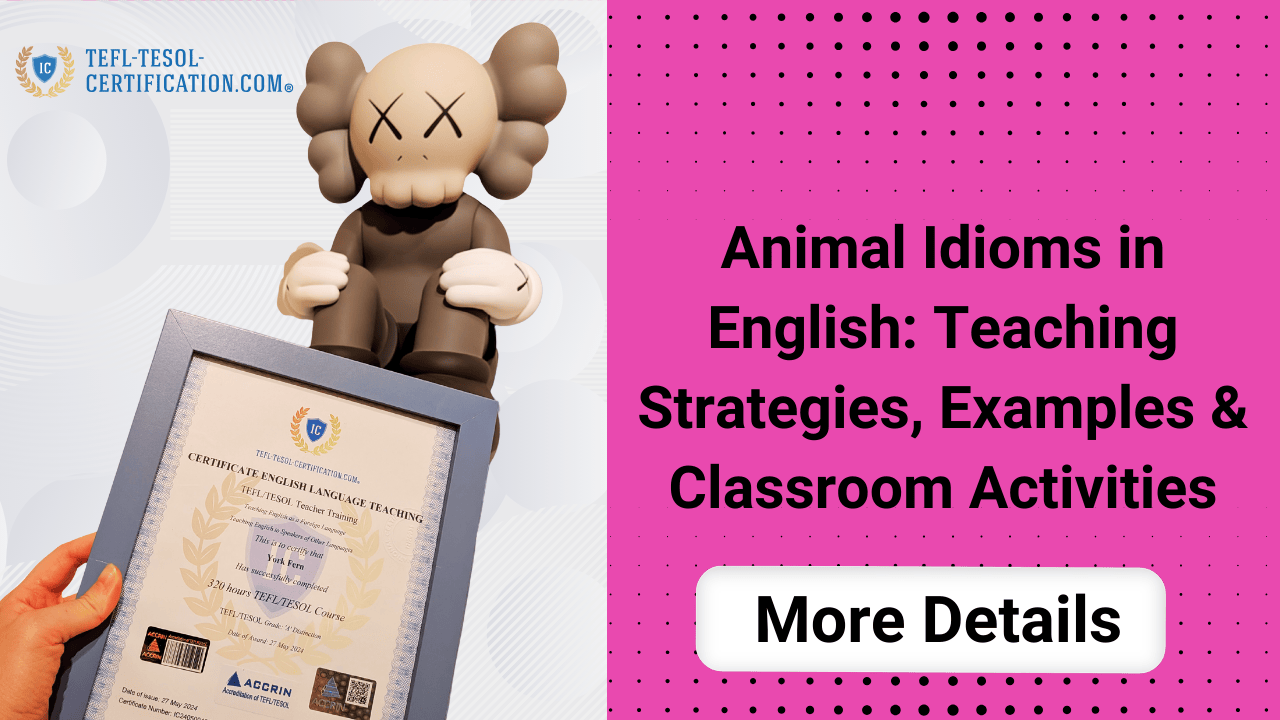And start earning money 💸 by teaching English in your own country, abroad, or online from anywhere on the planet! 🎁 Gifts and bonuses: professional support from your personal coach 🧑🏫 and job placement assistant 💼.

Advanced Travel English for Teachers: Lesson Ideas, Pragmatics, and Real-Life Scenarios
Table of contents
- Teaching Advanced Travel English: The Framework
- Cultural Awareness: Where Meaning Hides
- Travel Slang: When and How to Use It
- Travel Idioms: Teach Less, Mean More
- Nonverbal Communication in English-Speaking Countries
- Lesson Structure: TEFL/TESOL Approach
- Assessment and Progress
- Mini-Course Outline: Six 60–90-Minute Sessions
- Common Teaching Mistakes
- Homework Ideas
- Where TEFL/TESOL Course & Certification Fit In
- Adapting to Levels
- Essential Teaching Materials
- Accents and Registers
- Teacher’s Quick Checklist
- Conclusion: Travel English Is About People
Advanced Travel English is designed for learners who want to feel confident abroad and communicate naturally in real-life situations. It’s not just about airports or hotels—it’s about handling conversations with staff, asking for help, joining tours, dealing with emergencies, or chatting with locals. At this level, students should not only know phrases but also understand tone, subtext, and cultural nuance. The goal is to sound natural, polite, and context-aware.
Teaching Advanced Travel English: The Framework
“Advanced” here doesn’t mean complex grammar; it’s about context, pragmatics, and scenarios. Instead of teaching “what to say,” focus on “how to sound appropriate.” Link language to real travel contexts: check-in, baggage, tickets, transfers, platforms, rooms, tax refund, and insurance.
Key Skills to Develop
- Pragmatics: rephrasing, softening requests, clarifying, and polite refusal.
- Listening: accents, pace, airport or station noise.
- Micro-skills: booking, check-in/check-out, asking directions, making complaints politely.
- Documents: immigration, customs, baggage rules—minimal theory, maximum action.
Lesson Scenarios
- Airport: from boarding to baggage claim, including lost luggage and tight connections.
- City: bus stop, ticket office, platform, asking “Is this the right train to Paddington?”.
- Hotel: “Could I have a quiet room away from the lift?”, upgrades, late check-outs.
- Food: allergies, substitutions, missing reservations, checking if tips are included.
Sample Mini-Dialogue:
— “Hi! Quick question: is there a left-luggage near the main entrance?”
— “Sure, just past the ticket office. You can’t miss it.”
— “Perfect, thanks a lot!”
Cultural Awareness: Where Meaning Hides
Language is behavior. In English, “Sorry” lubricates conversation; “Please” isn’t optional. Distance in a queue and tone of voice matter. Code phrases like “That’s interesting” may mean “I need time to think,” and “Let me get back to you” often means a polite “no.”
How to Teach This
- Set the scene: one situation = one vocabulary set.
- Rephrase: “Give me water” → “Could I get some still water, please?”.
- Mark intonation: arrows ↑↓ on scripts to hear soft or firm tones.
- Practice pauses: “Hmm, I’m not sure… Could you repeat that?”—buy thinking time.
Polite Refusal Example:
— “Would you like to join our city tour?”
— “It sounds great, but we’ve already booked something for today. Maybe tomorrow?”
Travel Slang: When and How to Use It
Slang is like hot sauce: a pinch adds flavor, too much ruins the dish. Teach safe, global phrases learners will actually hear.
- Neutral+: “No worries”, “Cheers”, “Mate”, “Awesome”, “Heads-up”, “Grab a bite”, “Jet lag”.
- Situational: “Rip-off” (overpriced), “Sketchy” (shady), “Rain check” (postpone plans).
- Avoid: slang with possible offense or cultural risk.
Practice Tip: switch styles — “Could you help me with the luggage?” → “Hey, could you give me a hand with the luggage?”.
💡 Unlock the secrets to doubling your teaching income with our exclusive checklist! 🎯 This checklist is designed for English teachers who want to 📈 attract more students and 🔥 keep them engaged for the long term.
Barista Dialogue:
— “Flat white for York. Want a lid?”
— “Yes, please. By the way, is there a good brunch place nearby?”
— “There’s an awesome spot round the corner.”
Travel Idioms: Teach Less, Mean More
- “Hit the road” — leave/start a trip
- “Red-eye” — overnight flight
- “Off the beaten track” — unusual route
- “Miss the boat” — miss an opportunity
- “Call it a day” — finish for now
- “On the same page” — in agreement
- “Rule of thumb” — practical rule
- “Take a rain check” — postpone
Lesson Activities
- Context swap: show a station photo—students pick the matching idiom.
- Story dice: roll icons (bag, taxi, station) and build a story using 2–3 idioms.
- Error spotting: identify idioms used in wrong contexts.
Nonverbal Communication in English-Speaking Countries
- Eye contact: brief, regular, not staring.
- Distance: keep 1–1.5 steps at reception or in queues.
- Gestures: 👍 is fine; pointing can be rude; open palm is friendly.
- Posture: relaxed, arms open; avoid crossing arms when asking.
Quick In-Class Demos
- Silent correction: gesture to ear—student repeats louder.
- Mirror drill: match smile and tone—“Could you possibly…?” sounds softer.
- Queue game: form a queue, practice eye contact and “After you.”
Lesson Structure: TEFL/TESOL Approach
Use task-based methods: fewer lectures, more interaction. Highlight pragmatic choices.
🚀 More students, 💰 higher income, 🌍 complete freedom! ✅ 112 verified platforms with top rates ⏳ Flexible schedule – work whenever and as much as you want 🎯 Simple requirements – start earning right away 💎 Boost your career and income by teaching students worldwide!
Sample 60-Minute Lesson
- Hook (5 min): airport photo, quick poll—“Worst travel hiccup?”.
- Input (10 min): short dialogue, two idioms, one slang phrase.
- Guided practice (15 min): lost baggage, missing booking, finding the platform.
- Task (15 min): simulate a 40-minute connection; plan and act it out.
- Feedback (10 min): comment on tone, pauses, phrasing.
Assessment and Progress
- Understands polite vs direct meaning (“Let me think about it” = “no”).
- Can rephrase direct requests into soft ones.
- Shows nonverbal awareness: distance, eye contact, timing.
- Repairs communication: “Sorry, could you say that again?”
Mini-Course Outline: Six 60–90-Minute Sessions
- Airport Without Panic: passport control, boarding, seat requests.
- Arrival & Transport: baggage claim, lost & found, public transport.
- Hotel: check-in, complaints, upgrades.
- Food & Money: allergies, bills, currency exchange.
- Routes & Safety: tickets, timetables, idioms for plans.
- Unexpected Events: delays, insurance, medical help.
Common Teaching Mistakes
- Too much grammar: focus on tasks and role-plays instead.
- Overly formal language: teach natural alternatives (“Can I grab…?”).
- Ignoring accents: include various Englishes.
- No “rescue” phrases: teach “Sorry?”, “One more time, please.”
- Lack of visuals: use maps and signs.
- Forgetting nonverbal cues: tone, pause, smile matter.
Homework Ideas
- Record 3 short travel dialogues and reflect on hesitation points.
- Photo hunt: signs, boards, airport screens—note abbreviations (ETA, gate, etc.).
- Watch authentic videos and collect real phrases.
- Observe gestures and describe them in simple English.
Where TEFL/TESOL Course & Certification Fit In
A TEFL & TESOL course gives teachers the methodology and practical tools to run lessons like these with confidence. Certification demonstrates you can design task-based lessons, assess pragmatics, and manage mixed-ability groups—skills schools and online platforms expect.
Typical TEFL/TESOL Course Components
- Methodology: task-based learning, communicative techniques, lesson staging, error treatment.
- Language Awareness: functional language for travel (requests, clarifying, complaints), register and tone.
- Skills Teaching: listening in noisy environments, reading signs/timetables, interactional speaking.
- Classroom Management: pair/role rotation, timeboxing, feedback that targets effect, not just accuracy.
- Assessment: checklists and rubrics for outcomes (e.g., “solve a ticketing issue politely within 2 minutes”).
- Practicum/Micro-Teaching: lesson planning, delivery, reflection; building a portfolio of travel-English tasks.
Certification Outcomes You Can Showcase
- Lesson Portfolio: 3–6 complete plans (airport, hotel, transport, emergencies) with materials and scripts.
- Assessment Tools: pragmatic rubrics, self/peer checklists, “rescue phrases” banks.
- CEFR Mapping: can-do descriptors aligned to B1–C1 travel scenarios.
- Reflective Practice: evidence of iterative lesson improvement based on learner data.
How to Leverage TEFL/TESOL in Your Travel-English Syllabus
- Backward Design: pick the target travel outcomes → choose language/pragmatics → design tasks → select evidence of success.
- Task Bank: compile modular tasks (lost baggage, late check-out, missed connection) that can be scaled by level.
- Assessment First: write your rubric before materials; ensure each stage feeds the outcome.
- Micro-Credentials: issue mini-badges for mastered scenarios (e.g., “Hotel Complaint: Polite Resolution”).
Example TEFL/TESOL-Aligned Micro-Module (90 minutes)
- Outcome: resolve a booking problem without escalation.
- Language: softening (“I was wondering if…”), apologies (“I’m afraid…”), confirming (“So to double-check…”).
- Task: role-play front desk with constraints (time, noise, missing details); rotate roles; record and reflect.
- Assessment: rubric on politeness, repair, and completion; peer notes; teacher feedforward targets.
Why Certification Matters
TEFL & TESOL certification signals to employers and learners that you can design outcome-focused lessons, measure progress meaningfully, and adapt for accents, registers, and cultural norms—core competencies for teaching Advanced Travel English in classrooms or online.
Adapting to Levels
For Pre-Intermediate
- Fewer idioms, more set phrases: “Could you…?”, “I’m looking for…”.
- Intonation scripts with arrows and pauses.
- Clear prompt cards for lost booking or passport.
For Upper-Intermediate+
- More focus on cultural nuance and tone.
- Practice polite complaints: “We loved the room, but the AC was a bit noisy.”
- Teach softening structures: kind of, a bit, I was wondering if…
Essential Teaching Materials
- Visual cards: train, plane, hotel, ticket counter.
- Audio clips: announcements, city sounds, real voices.
- Feedback templates: checklists for tone and phrasing.
Accents and Registers
- Registers: formal (“Would you mind…”), neutral (“Could you…”), informal (“No worries”).
- UK/US Vocabulary: queue/line, loo/bathroom, timetable/schedule.
- Pronunciation: train airport listening through context, not perfect sound.
Teacher’s Quick Checklist
- 🎯 Goal: travel confidently, avoid miscommunication.
- Include 2–3 idioms, 3–5 polite phrases, and 2 slang expressions.
- Emphasize tone, pause, and eye contact.
- Use role-plays with time limits and feedback on phrasing.
Conclusion: Travel English Is About People
Travel English isn’t a list of phrases—it’s a toolkit for real connection. Add a bit of pragmatics, idioms, slang, and gesture training, and your students will travel with confidence. As a teacher, you’ll see that success on your students’ faces when they land abroad—calm, polite, and understood.
Terms used:
EFL, ESL, TEFL, TESOL

York Fern
An English instructor with 12+ years of experience. I work for an online school and travel the world, teaching students from various countries, leveraging my TEFL/TESOL certification. Seeing the world's oceans, mountains, and cities with my own eyes has given me a profound appreciation for the importance of quality education and international communication.
and start earning by teaching English in your country, abroad, or online from anywhere in the world! Order the course with a 50% discount 💸 and receive as a gift the support of a personal coach 👨🏫 and job placement assistant! 🎁🚀 Hurry, limited spots available! 🏃♂️💨
💡 Unlock the secrets to doubling your teaching income with our exclusive checklist! 🎯 This checklist is designed for English teachers who want to 📈 attract more students and 🔥 keep them engaged for the long term.
🚀 More students, 💰 higher income, 🌍 complete freedom! ✅ 112 verified platforms with top rates ⏳ Flexible schedule – work whenever and as much as you want 🎯 Simple requirements – start earning right away 💎 Boost your career and income by teaching students worldwide!
choose us?



